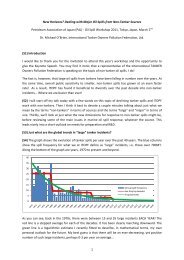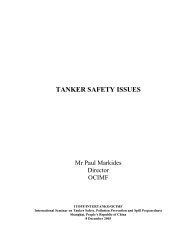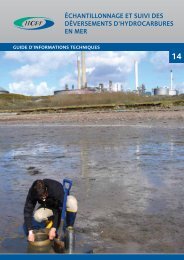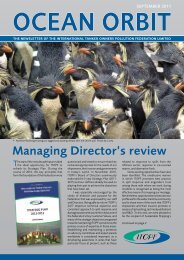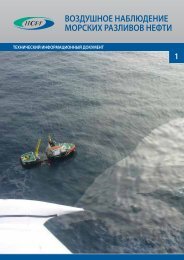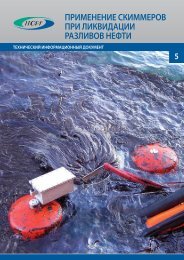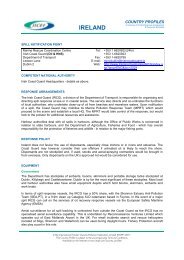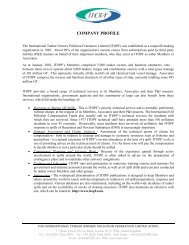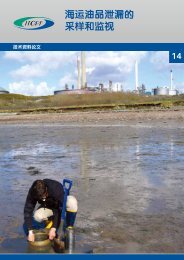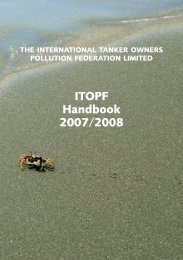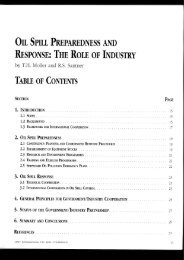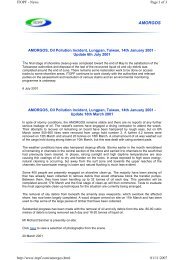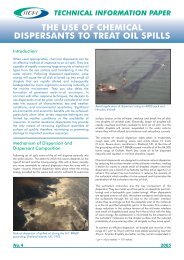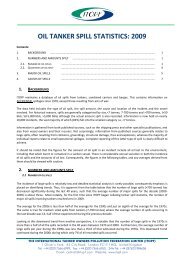Members Handbook 20023 - ITOPF
Members Handbook 20023 - ITOPF
Members Handbook 20023 - ITOPF
You also want an ePaper? Increase the reach of your titles
YUMPU automatically turns print PDFs into web optimized ePapers that Google loves.
Claims Handling<br />
P&I Clubs and the 1992 Fund cooperate<br />
closely in the assessment and<br />
settlement of claims, usually using joint<br />
experts such as <strong>ITOPF</strong>. In the event of a<br />
major incident a local claims office is<br />
usually established to assist potential<br />
claimants and to facilitate the<br />
submission of claims.<br />
Admissible Claims<br />
For a claim to be admissible it must fall<br />
within the definition of pollution<br />
damage or preventive measures in the<br />
1992 CLC and Fund Convention. A<br />
uniform interpretation of the definitions<br />
and a common understanding of what<br />
constitutes an admissible claim are<br />
essential for the efficient functioning<br />
of the international system of<br />
compensation. For this reason, the<br />
Governments of the Member States of<br />
the 1992 Fund have established clear<br />
policies and guidelines, as summarised<br />
in the organisation’s Claims Manual.<br />
Admissible claims can fall under a<br />
number of general headings:<br />
• Preventive measures<br />
(including clean-up)<br />
• Damage to property<br />
• Economic losses<br />
• Reinstatement/restoration of<br />
impaired environments<br />
Preventive Measures<br />
Claims for measures aimed at<br />
preventing or minimising pollution<br />
damage may include the costs of<br />
removing oil (cargo and fuel) from a<br />
damaged tanker or a sunken tanker<br />
wreck posing a serious pollution threat,<br />
as well as the costs of clean-up<br />
measures at sea, in coastal waters and<br />
on shorelines. The costs of disposing of<br />
recovered oil and associated debris are<br />
also covered.<br />
To qualify for compensation under the<br />
Conventions, the costs as well as the<br />
preventive measures themselves have<br />
to be “reasonable”. This is generally<br />
interpreted to mean that the measures<br />
taken or equipment used in response to<br />
an incident were, on the basis of an<br />
expert technical appraisal at the time the<br />
decision was taken, likely to have been<br />
successful in minimising or preventing<br />
pollution damage. The fact that the<br />
response measures turned out to be<br />
ineffective or the decision was shown to<br />
be incorrect with the benefit of<br />
hindsight are not reasons in themselves<br />
for disallowing a claim for the costs<br />
involved. A claim may be rejected,<br />
however, if it was known that the<br />
measures would be ineffective but they<br />
were instigated simply because, for<br />
example, it was considered necessary<br />
“to be seen to be doing something”. On<br />
this basis, measures taken for purely<br />
public relations reasons would not be<br />
considered reasonable.<br />
Property Damage<br />
Claims under this category would<br />
include the costs of cleaning<br />
contaminated fishing gear, mariculture<br />
installations, yachts and industrial water<br />
intakes. In cases of very severe<br />
contamination of fishing gear and<br />
mariculture equipment where effective<br />
33



